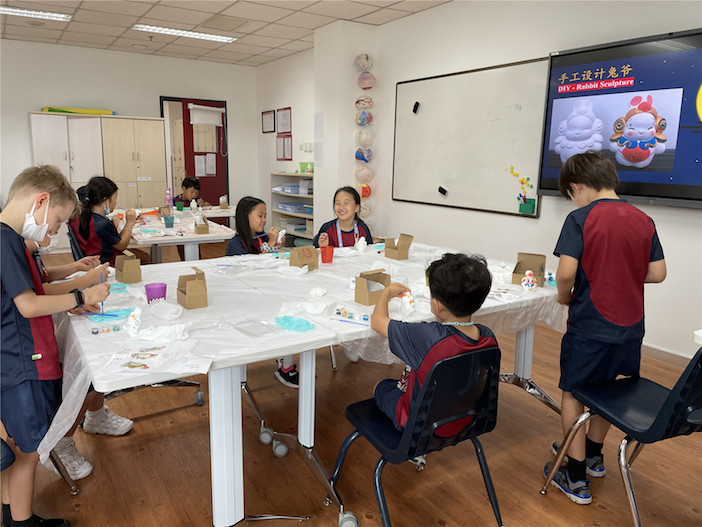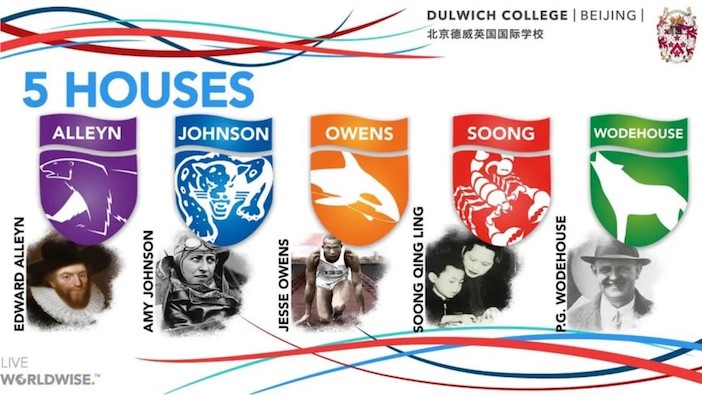On the extensive checklist of things that need to be taken care of when moving to a new country or city, apart from finding a place to live, few things are more important for families with kids than finding the right school. A good school will not only give your children the tools they need to get the best out of their education, but will also function as a community for you and your family.
That’s all very well, but how should you go about choosing? While it may be easy to get sucked in by big brand names, attractive campuses, and fancy curricula that promise outstanding exam results, in the long run, the most important thing is to find a school with a learning philosophy that suits your child and a clear set of values that match your family’s. For Anthony Coles, Head of College at Dulwich College Beijing, the school’s seven values — resilience, confidence, respect, integrity, responsibility, open-mindedness, kindness — help to build a community and guide staff in nurturing students who not only succeed academically but who are “great people and great lifelong learners.”

Exploring the admissions process
No matter what age your children are, the admissions process at Dulwich College Beijing (DCB) is designed to help prospective students explore those values while also putting them through their paces academically. As Director of Admissions and Marketing, See Kay Leong, explains, students undergo age-tailored entrance assessments and interviews with teachers and admissions staff to make sure that they are equipped for DCB’s academically-rigorous curriculum and also to explore any extra-curricular interests. This selectiveness is certainly not unique to DCB and is ultimately about making sure that both children and their parents are a good fit for the school community. As Leong notes, “it’s a two-way street; we want to make sure that our families are contributing to the school.”
As a result, the on-boarding process starts as soon as enrollment is confirmed, leveraging a variety of tools to help families get to know the school. Children are assigned a buddy that they meet both virtually and in person, and parents automatically become members of the school’s active parents association, Friends of Dulwich. If you are concerned about how you’ll know if your child is settling in ok (since, as we know, they don’t always tell their parents), look for a school like DCB that sets up “checkpoints” with a pastoral team consisting of the form tutor, head of year and key stage leader throughout the term for new students to make sure that no-one who is struggling slips through the cracks.
Now you’re speaking my language

One of the key considerations for students attending international schools in a foreign country should be if and how the school teaches the host country language. Beyond the obvious benefit of adding another language to your roster, foreign language learning “helps develop overall communication skills and build confidence,” Coles says. DCB takes a dual language approach in Mandarin and English in Early Years (ages 3 to 7), exposing younger children to both languages in a natural learning context throughout the day. This gives children the confidence to actually use and understand language in a way that helps them get the most out of their lives in Beijing, in line with DCB’s mission to “Live Worldwise”.

Choosing the right curriculum can have an important effect on a child’s schooling, both in terms of their enjoyment and their success. Unlike where many of us will have gone to school in our home countries, where we probably studied a set national curriculum, international schools in Beijing are free to choose their own curriculum. We published a breakdown of the various curriculum on offer in Beijing in this year’s School Choice Guide. Children up to age 5 at DCB follow the Early Years Foundation Stage, and from Year 1 to Year 9, they follow the National Curriculum of England and Wales, enhanced to meet the needs of the school’s diverse student body. The English National Curriculum is not only highly structured and academically rigorous, but since it is also taught widely by schools around the world, it enables children to pick up where they left off in the event you have to move schools (or countries!). In Year 10 DCB students begin the IGCSE (International General Certificate of Secondary Education), a rigorous two-year course that prepares students well for the two-year International Baccalaureate Diploma Programme (IBDP) starting in Year 12.
Beyond the classroom
Sports and arts programs often end up being the most memorable part of the school experience — who can remember their 8th grade math classes but who could forget the first time they lifted a trophy with their sports team? The benefits of these kind of non-academic activities are myriad, from building team work skills to improving time management. “In essence, [extra-curricula activities are] about balance, helping students build interests and confidence beyond academic settings,” explains Coles. If your child has already demonstrated an aptitude for a specific sport or instrument, then finding a school that has a good track record in that field might end up being your number one consideration.

As two of DCB’s four pillars of education (the others being academic excellence and service to others), sports and creative arts are well-served by state-of-the-art theaters, football and cricket pitches, and even a green screen film studio for budding Spielbergs — to name but a few. Coles also notes that being part of an international network of six colleges in Asia gives DCB students a platform to showcase their talents to a wider audience through network-wide events like the Dulwich Olympiad and the MADD (Music, Art, Drama and Dance) Festival for Junior School students, which still took place online this year despite the influence of the pandemic.

House System
One of the most important things for new students to settle in a school is the care and support they receive from their teachers and classmates. The system of pastoral care is highly developed at Dulwich College Beijing. Teachers and form tutors here are responsible not only for every student’s academic development, but also for ensuring they receive the pastoral support they need. DCB has a pastoral support team for students at all levels, and all of them follow a Personal, Social and Health Education (PSHE) course appropriate to their age and coordinated across the year groups.

Feeling intrigued by the Hogwarts Houses? DCB students have their own House system, an integral part of the College pastoral care structure! On arriving at DCB, all students are allocated to one of five Houses, where they remain during their time at DCB. DCB’s Houses are named after inspirational and accomplished people: Edward Alleyn, Sir Pelham Grenville Wodehouse, Jesse Owens, Soong Ching-ling and Amy Johnson.

The House System builds a sense of community within the student body and helps to develop students’ leadership skills. House Captains and students are responsible for helping to organise House activities, which normally take the form of friendly competitions.
Coles emphasizes that “young people need to feel safe and protected to learn effectively. Children with a sense of belonging feel accepted, loved, and connected to others as a part of a community. Our responsibility to base our daily interactions on solid known values and to build a positive learning culture is critical for our students to develop a deep sense of belonging at school that reflects how accepted, respected, and supported they feel in their social context at school.”

At the end of the day, there is no one-size-fits-all solution to choosing a school. It is often a trial and error experience, particularly for younger children who may not yet have developed a distinct learning style or shown an interest in sports or the arts. However, look beyond the headline stats and choose a school that aligns with the values you want to instill in your child, and you may just find yourself part of a community that grows and learns along with you.
Images courtesy of Dulwich College Beijing




